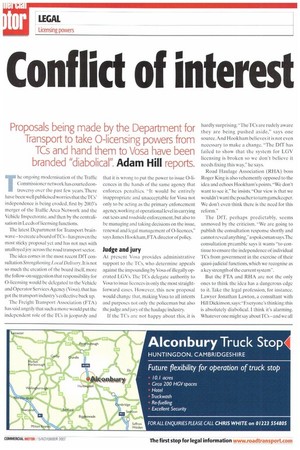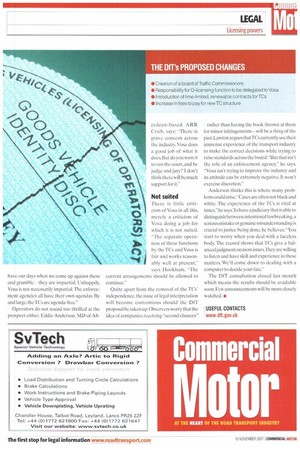Conflict of interest
Page 38

Page 39

If you've noticed an error in this article please click here to report it so we can fix it.
Proposals being made by the Department for
Transport to take 0-licensing powers from TCs and hand them to Vosa have been branded "diabolical". Adam Hill reports.
The ongoing modernisation of the Traffic Commissioner network has courted controversy over the past few years. There have been well publicised worries that the TCs' independence is being eroded, first by 2003's merger of the Traffic Area Network and the Vehicle Inspectorate, and then by the centralisation in Leeds of licensing functions.
The latest Department for Transport brainwave —to create a board of TCs — has proven the most sticky proposal yet and has not met with unalloyed joy across the road transport sector.
The idea comes in the most recent DfT consultation Strengthening Local Delivery. It is not so much the creation of the board itself, more the follow-on suggestion that responsibility for 0-licensing would be delegated to the Vehicle and Operator Services Agency (Vosa).that has got the transport industry's collective back up.
The Freight Transport Association (ETA) has said angrily that such a move would put the independent role of the TCs in jeopardy and that it is wrong to put the power to issue 0-licences in the hands of the same agency that enforces penalties. -It would be entirely inappropriate and unacceptable for Vosa not only to be acting as the primary enforcement agency,working at operational level in carrying out tests and roadside enforcement, but also to be managing and taking decisions on the issue, renewal and legal management of 0-licences," says James Hook ham, ETA director of policy.
Judge and jury At present Vosa provides administrative support to the TCs, who determine appeals against the impounding by Vosa of illegally operated LGVs. The TCs delegate authority to Vosa to issue licences in only the most straightforward cases. However, this new proposal would change that, making Vosa to all intents and purposes not only the policeman but also the judge and jury of the haulage industry.
If the TCs are not happy about this, it is hardly surprising."TheTCs are rudely aware they are being pushed aside," says one source. And Hookham believes it is not even necessary to make a change. "The DfT has failed to show that the system for LGV licensing is broken so we don't believe it needs fixing this way," he says.
Road Haulage Association (RHA) boss Roger King is also vehemently opposed to the idea and echoes Hookham's points. "We don't want to see it," he insists. "Our view is that we wouldn't want the poacher to turn gamekeeper. We don't even think there is the need for this reform."
The INT, perhaps predictably, seems unmoved by the criticism. "We are going to publish the consultation response shortly and cannot reveal anything," a spokesman says:The consultation preamble says it wants "to continue to ensure the independence of individual TCs from government in the exercise of their quasi-judicial functions, which we recognise as a key strength of the current system".
But the FTA and RH A are not the only ones to think the idea has a dangerous edge to it. Take the legal profession, for instance. Lawyer Jonathan Lawton, a consultant with Hill Dickinson, says:"F.veryone's thinking:this is absolutely diabolical. I think it's alarming. Whatever one might say about TCs — and we all have our days when we come up against them and grumble — they are impartial. Unhappily. Vosa is not necessarily impartial. The enforcement agencies all have their own agendas. By and large, the TCs are agenda-free."
Operators do not sound too thrilled at the prospect either. Eddie Anderson. MD of Ab
erdeen-based A RR Craib, says: "There is (*rave concern across the industry. Vosa does a good job of what it does. But do you want it to run the court, and be judge and jury? I don't think there will be much support for it."
Not suited There is little criticism of Vosa in all this, merely a criticism of Vosa doing a job for which it is not suited. "The separate operation of these functions by the TCs and Vosa is fair and works reasonably well at present," says liookham. "The current arrangemen ts should be allowed to continue."
Quite apart from the removal of the TCs' independence, the issue of legal interpretation will become contentious should the DtT proposal be taken up. Observers worry that the idea of companies receiving "second chances" — rather than having the book thrown at them for minor infringements — will be a thing of the past. Lawton argues that TCs currently use their immense experience of the transport industry to make the correct decisions while trying to raise standards across the board. "But that isn't the role of an enforcement agency," he says. "Vosa isn't trying to improve the industry and its attitude can be extremely negative. It won't exercise discretion."
Anderson thinks this is where many problems could arise. 'Cases are often not black and white. The experience of the TCs is vital at times," he says.To have a judiciary that is able to distinguish between intentional lawbreaking, a serious mistake or genuine misunderstanding is crucial to justice being done, he believes. "You start to worry when you deal with a faceless body. The record shows that TCs give a balancedjudgment on most issues.They are willing to listen and have skill and experience in these matters. Well come down to dealing with a computer to decide your fate."
The D1T consultation closed last month which means the results should be available soon. Few announcements will be more closely watched. •


























































































































































































